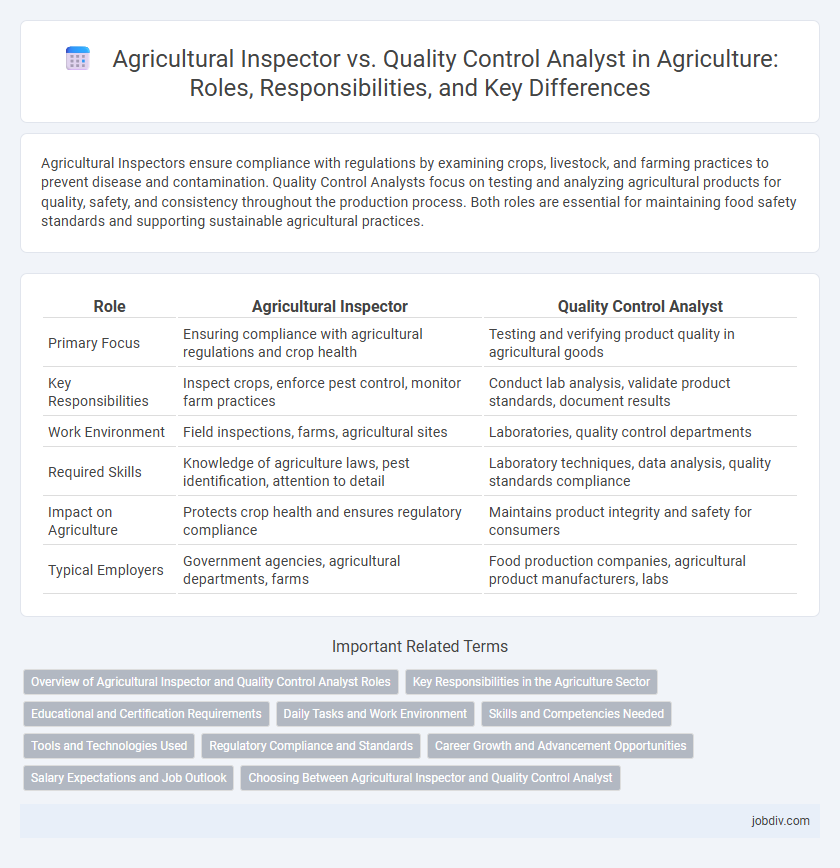Agricultural Inspectors ensure compliance with regulations by examining crops, livestock, and farming practices to prevent disease and contamination. Quality Control Analysts focus on testing and analyzing agricultural products for quality, safety, and consistency throughout the production process. Both roles are essential for maintaining food safety standards and supporting sustainable agricultural practices.
Table of Comparison
| Role | Agricultural Inspector | Quality Control Analyst |
|---|---|---|
| Primary Focus | Ensuring compliance with agricultural regulations and crop health | Testing and verifying product quality in agricultural goods |
| Key Responsibilities | Inspect crops, enforce pest control, monitor farm practices | Conduct lab analysis, validate product standards, document results |
| Work Environment | Field inspections, farms, agricultural sites | Laboratories, quality control departments |
| Required Skills | Knowledge of agriculture laws, pest identification, attention to detail | Laboratory techniques, data analysis, quality standards compliance |
| Impact on Agriculture | Protects crop health and ensures regulatory compliance | Maintains product integrity and safety for consumers |
| Typical Employers | Government agencies, agricultural departments, farms | Food production companies, agricultural product manufacturers, labs |
Overview of Agricultural Inspector and Quality Control Analyst Roles
Agricultural Inspectors ensure compliance with regulations by examining crops, soil, and agricultural equipment to prevent disease and contamination, safeguarding food safety and environmental health. Quality Control Analysts monitor and test agricultural products and processes to maintain standards, using scientific methods to analyze samples for quality, safety, and consistency. Both roles are critical in the agricultural supply chain, with inspectors focusing on regulatory enforcement and analysts emphasizing product quality assurance.
Key Responsibilities in the Agriculture Sector
Agricultural Inspectors primarily ensure compliance with agricultural laws by examining crops, livestock, and farming practices to prevent pests, diseases, and contamination. Quality Control Analysts focus on testing soil, water, and agricultural products to maintain quality standards and ensure safety for consumption and export. Both roles are critical in upholding food safety, regulatory standards, and sustainable agricultural production.
Educational and Certification Requirements
Agricultural Inspectors typically require a bachelor's degree in agricultural science, biology, or a related field, often complemented by state-specific certification or licenses depending on the jurisdiction. Quality Control Analysts in agriculture generally need a degree in food science, agronomy, or chemistry, with certifications such as HACCP (Hazard Analysis Critical Control Point) or ISO 22000 enhancing their credentials. Both roles emphasize formal education, but Agricultural Inspectors focus more on regulatory compliance training, while Quality Control Analysts prioritize laboratory and product safety certifications.
Daily Tasks and Work Environment
Agricultural Inspectors conduct field inspections to ensure compliance with safety standards and regulations, focusing on crop health, pest control, and soil quality in outdoor or farm settings. Quality Control Analysts primarily operate in laboratories or production facilities, performing tests on agricultural products to detect contaminants and verify quality specifications. Both roles require attention to detail, but Agricultural Inspectors engage more in fieldwork while Quality Control Analysts emphasize data analysis and laboratory procedures.
Skills and Competencies Needed
Agricultural Inspectors require strong knowledge of plant and animal health, pest control, and regulatory compliance, alongside keen observational skills and attention to detail to ensure adherence to agricultural standards. Quality Control Analysts must possess expertise in product testing methodologies, statistical analysis, and quality assurance protocols, combined with proficiency in data interpretation and problem-solving to maintain product integrity. Both roles demand critical thinking, effective communication, and the ability to follow strict safety and quality regulations within the agricultural sector.
Tools and Technologies Used
Agricultural Inspectors utilize tools such as GPS devices, spectrometers, and drone technology to monitor crop health and detect pests or diseases in the field. Quality Control Analysts rely on laboratory instruments like chromatography systems, pH meters, and moisture analyzers to assess the quality and safety of agricultural products. Both roles incorporate software platforms for data analysis and reporting to ensure compliance with regulatory standards and optimize agricultural output.
Regulatory Compliance and Standards
Agricultural Inspectors ensure farms and agricultural products comply with federal and state regulations by conducting field inspections and enforcing standards related to pesticide use, crop conditions, and animal health. Quality Control Analysts focus on testing and analyzing agricultural products in laboratories to verify adherence to safety, quality, and purity standards set by agencies like the FDA and USDA. Both roles are critical for maintaining regulatory compliance but differ by field inspections versus laboratory analysis within the agricultural supply chain.
Career Growth and Advancement Opportunities
Agricultural Inspectors focus on regulatory compliance and safety standards within farming operations, often advancing to senior inspection roles or regulatory agencies. Quality Control Analysts specialize in testing and ensuring product standards, with career growth leading to supervisory positions in laboratories or quality assurance management. Both careers offer pathways into specialized agricultural sectors, but Quality Control Analysts frequently experience faster advancement due to increasing demand for precise product quality and safety data.
Salary Expectations and Job Outlook
Agricultural Inspectors typically earn an average salary ranging from $40,000 to $65,000 annually, with job growth projected at 5% over the next decade due to increased food safety regulations. Quality Control Analysts in agriculture can expect salaries between $50,000 and $75,000, benefiting from a stronger job outlook of 7%, driven by the demand for advanced testing and compliance with industry standards. Both roles emphasize quality assurance, but Quality Control Analysts generally have higher salary expectations and a more robust employment forecast.
Choosing Between Agricultural Inspector and Quality Control Analyst
Choosing between an Agricultural Inspector and a Quality Control Analyst depends on career goals and skill sets; Agricultural Inspectors focus on ensuring compliance with agricultural laws, plant health, and pest control, while Quality Control Analysts emphasize testing and analyzing agricultural products for safety and standards. Those interested in fieldwork, regulatory enforcement, and plant inspections may prefer the role of an Agricultural Inspector. Candidates with strengths in laboratory analysis, data interpretation, and product quality assessment are better suited for a Quality Control Analyst position.
Agricultural Inspector vs Quality Control Analyst Infographic

 jobdiv.com
jobdiv.com